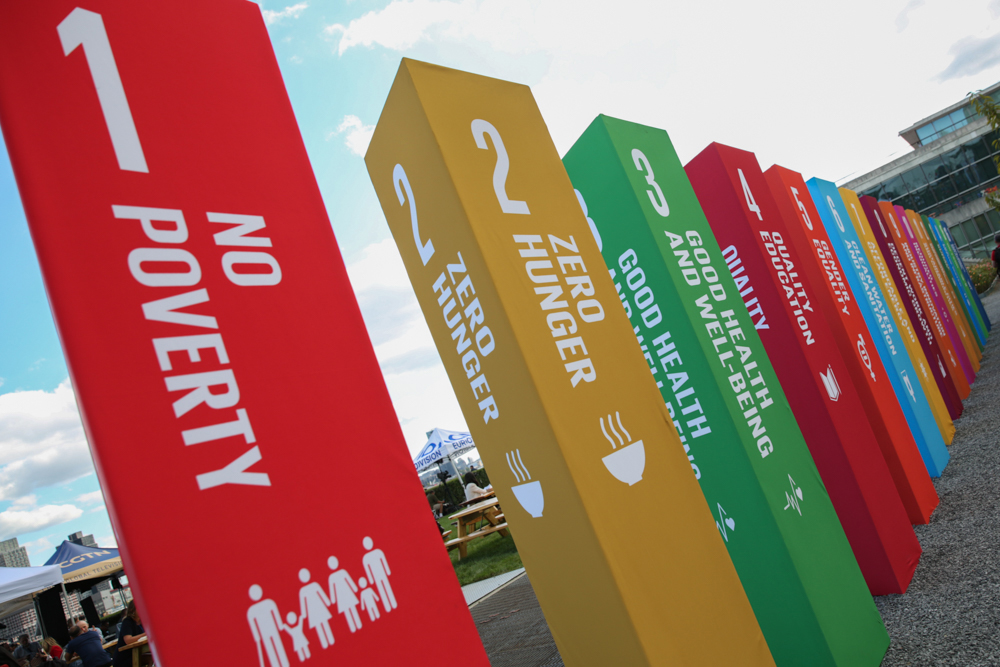By Frank Biermann, Thomas Hickmann, Carole-Anne Sénit and Yixian Sun
Sustainability has never been higher on the international agenda. But an international assessment of the Sustainable Development Goals (SDGs)—the 17 global goals used by governments, companies, and NGOs worldwide to guide action towards a prosperous and just future—shows they are having limited impact and may instead be contributing to greenwashing. Two years into the decisive decade for humanity's future on Earth, fundamental changes are needed if we are to shift onto a sustainable and resilient path, argue the authors of a study recently published in Nature Sustainability.
As part of the study, a team of 61 scholars analysed over 3000 publications, which include peer-reviewed academic papers and policy studies from think tanks or research institutes, to try to understand how the goals are influencing global and national debates, laws, policies, as well as broader changes to political institutions. This is the most comprehensive assessment to date to understand the political impact of the SDGs. Yixian Sun, Assistant Professor in International Development at the University of Bath and Centre for Development Studies (CDS) is a co-author of the study.
Limited transformative political impact of the SDGs
The study found that although the goals may be changing the way governments and other organisations understand and communicate about sustainability, there is little evidence—seven years after their launch and eight years before they are supposed to be achieved—that the SDGs are contributing to reducing inequalities, climate action, or better protection of biodiversity and nature. Despite extensive PR campaigns surrounding the goals, “we see no strong evidence of funding being reallocated to sustainable development, that new or more demanding laws are being established because of the SDGs, or that policies are becoming more stringent,” says Frank Biermann, professor at Utrecht University and lead author of the study. “And changes we do see often reflect processes launched well before the 2030 Agenda came into force”.

A global agenda
In 2015, United Nations (UN) member states agreed on 17 sustainable development goals, which sit at the heart of the UN’s global “2030 Agenda for Sustainable Development”. The goals cover a wide range of social and environmental issues, including ending all forms of poverty, providing clean and affordable energy for all, and tackling climate change, all while ensuring that ‘no one is left behind’. Although non-binding, UN member states are expected to use the goals to frame their agendas and political policies up to 2030. Before 2015, the UN had conducted the largest consultation in its history to gauge what the SDGs should include. “This has meant that the goals have been widely accepted among many different groups,” explains Biermann. Government agencies, cities, multinationals, small businesses, NGOs, and universities across the world use the goals to frame their sustainability efforts. So what is going wrong?
Evidence of greenwashing
The private sector is not immune either. More than ever banks and companies are investing in sustainability initiatives, promoting green financing, facilitating large-scale sustainable infrastructure projects, or expanding their loan portfolios to include environmental and social loans. However, there is also ample evidence of greenwashing. “It’s increasingly clear that SDG-related rhetoric is being used to camouflage business as usual,” says co-author Thomas Hickmann, an Assistant Professor at Lund University in Sweden. Despite this, there have also been modest successes. The research shows that civil society actors in several countries are increasingly holding governments accountable for their commitments to ‘leaving no one behind’, mobilising participation, and bringing to the table the voices of those on the frontlines of poverty, inequality, and vulnerability.
A change in approach crucial
The assessment, which consists of a book and a journal article synthesising the book’s core insights, is published as representatives from around the world return from Stockholm, where they marked 50 years since the 1972 United Nations Conference on the Human Environment—the first conference to put the environment on the international agenda, and which led to the establishment of the UN Environment Programme (UNEP). One of a string of recent high-profile global megaconferences attempting to mobilise action for a sustainable future, Stockholm+50 aimed to act as a springboard to deliver the SDGs by 2030. “But if the goals are having limited impact and are instead contributing to maintaining the destructive status quo, now is the moment we must fundamentally change the way we do things,” urges Professor Biermann.
“I strongly advise everyone in political office to read this book,” says Johan Rockström, Director of the Potsdam Institute for Climate Impact Research, who was not part of the study. “We are already two years into the decisive decade for humanity's future on Earth. Reaching the safe and just landing zone defined by the SDGs requires transformative thinking and doing. Also in politics". According to Yixian Sun, “The assessment sheds light on the limitations of the implementation of the SDGs. So it sends a strong signal to the governments around the world about the urgent need of making transformative changes in order to secure a sustainable future.”
This blog is based on a summary published by Utrecht University and the wider study: Biermann, F., Hickmann, T., Sénit, C.-A., Beisheim, M., Bernstein, S., Chasek, P., Grob, L., Kim, R. E., Kotzé, L. J., Nilsson, M., Ordóñez Llanos, A., Okereke, C., Pradhan, P., Raven, R., Sun, Y., Vijge, M. J., van Vuuren, D., & Wicke, B. (2022) 'Scientific evidence on the political impact of the Sustainable Development Goals', Nature Sustainability.
Respond